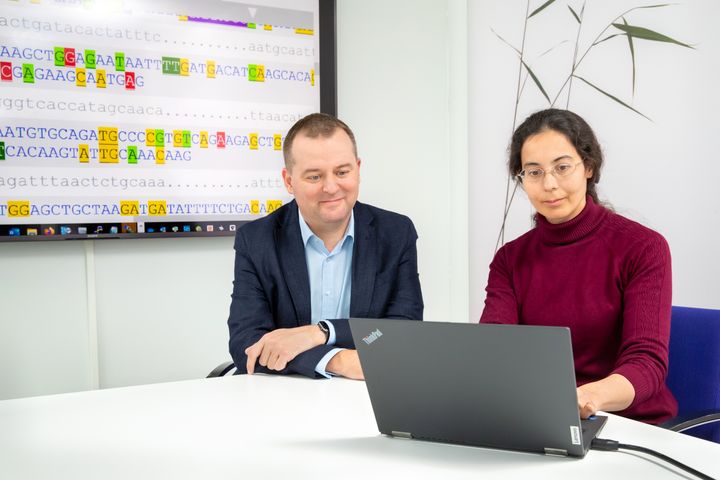New gene test developed at HUS helps in prescribing medicines

Not all medicines are suitable for everyone. With some medicines, the human genes determine what kind of effect the medicine will have. Before prescribing this type of medicines, it may be necessary to perform a gene test on the patient to help the physician select the medicine and determine the dose correctly.
Previously, HUS Diagnostic Center always tested one gene with an impact on pharmacotherapy at a time. The new test, implemented in January, can be used to simultaneously examine all those gene variants associated with medicines that are currently clinically relevant.
This way, information about the patient is also collected in advance for possible subsequent pharmaceutical treatments. Treatment can also be started sooner when there is no need to wait for the results of the new gene test. The test results may affect both the choice of the medicine and the dose.
“More than one half of HUS’s patients receive medication in which it would be beneficial to take into account genetic variation,” says Mikko Niemi, Professor of Pharmacogenetics at the University of Helsinki and Head Physician at HUS Diagnostic Center. He was in charge of the development of the new gene test.
The test can be modified if new research so requires
The testing begins with the collection of a blood sample from which DNA is isolated. The genes in the DNA are analysed using a laboratory method developed at HUS Diagnostic Center and a computer program developed for this test.
“At the moment, the customer receives the result in about a week,” explains Arto Orpana, Chief Clinical Chemist from HUS, who was involved in creating the test.
New features are constantly added to the test, which currently provides information on 12 different genes. The test has been built to allow modifications if medical research provides new information on the effect of genes on the efficacy of medicines.
The samples are examined at the Genetics laboratory of HUS Diagnostic Center. No other party in Finland conducts such comprehensive research on genes affecting pharmacotherapy. A special feature of the test is its advanced interpretation of results to facilitate clinical work. The test is available at HUS Diagnostic Center for the whole of Finland.
The new gene test provides information only on the suitability of medicines. In other words, it does not reveal any hereditary diseases or other characteristics.
Cutting-edge technical implementation
So far, the new genetic test has been performed on 2,000 samples at HUS Diagnostic Center. Most of the tests have been performed on cancer patients. Other groups have included patients with depression, inflammatory bowel diseases and skin diseases.
The new test developed at HUS Diagnostic Center is internationally unique. Testing can now be done even faster and it is cheaper.
“We have managed to make the costs low. These tests are often expensive,” Niemi says. “In terms of its technical implementation, the test is cutting-edge.”
A system is currently being built in the Apotti patient information system to automatically check the results of the patient's gene test. For example, the system may suggest that the physician treating the patient should prescribe a certain dose or select another medicine.
HUS has also published an online Pharmacogenetics Guide for prescribers of medicines.
More information for the media:
Contacts
Mikko Niemi, Professor of Pharmacogenetics, Head Physician
+358 50 428 0998, mikko.niemi(at)hus.fi
Arto Orpana, Chief Clinical Chemist
+358 427 0647, arto.orpana(at)hus.fi
Images

About HUS
At HUS Helsinki University Hospital about 680 000 patients receive medical care annually. We have almost 27,000 professionals working for the best of all patients. We are responsible for providing specialized health care for the residents of our 24 member municipalities. In addition, the treatment of many rare and severe diseases is nationally centralized to HUS.
HUS is the biggest health care provider and the second largest employer in Finland. Our expertise is internationally recognized and accredited. As a university hospital, we continuously develop and evaluate our treatment methods and activities.
Subscribe to releases from HUS
Subscribe to all the latest releases from HUS by registering your e-mail address below. You can unsubscribe at any time.
Latest releases from HUS
Gips räcker vid frakturer på mediala humerusepikondylen vid armbågsleden hos barn9.9.2025 09:55:56 EEST | Pressmeddelande
I en nyligen publicerad studie framgick det att gipsning som behandling vid frakturer på mediala humerusepikondylen hos barn är en lika effektiv behandlingsform som operation. De resultat som man nu fått stöder gipsbehandling som primär behandlingsform och behandlingen kan förenhetligas på riksnivå.
Kipsi riittää lasten kyynärnivelen koukistajalisäkkeen murtumissa9.9.2025 09:55:56 EEST | Tiedote
Juuri julkaistussa tutkimuksessa selvisi, että lasten kyynärnivelen koukistajalisäkkeen murtumien hoidossa kipsaus on yhtä tehokas hoitomuoto kuin leikkaus. Nyt saadut tulokset tukevat kipsihoidon käyttöä ensisijaisena hoitomuotona, ja hoitoa voidaan yhtenäistää kansallisesti.
Den nyaste ekonomiska prognosen för hela 2025: HUS är på väg att uppnå sina ekonomiska mål för 20258.9.2025 12:09:48 EEST | Pressmeddelande
HUS-sammanslutningens styrelse behandlade på sitt möte verksamheten och ekonomin i januari–juli samt den nyaste årsprognosen för hela 2025. HUS-sammanslutningens operativa resultat beräknas uppvisa ett överskott på 0,1 miljoner euro. Sammanslutningens styrelse fastställde också investeringsplanen och investeringsprogrammet för de kommande åren.
Koko vuoden 2025 uusin talousennuste: HUS pääsemässä vuonna 2025 taloudellisiin tavoitteisiinsa8.9.2025 12:09:48 EEST | Tiedote
HUSin yhtymähallitus käsitteli kokouksessaan tammi–heinäkuun taloutta sekä uusinta koko vuoden 2025 vuosiennustetta. HUS-yhtymän operatiivisen tuloksen ennustetaan päätyvän 0,1 miljoonaa euroa ylijäämäiseksi. Yhtymähallitus vahvisti myös tulevien vuosien investointisuunnitelman ja -ohjelman.
Förebyggande av RS-virusinfektion hos spädbarn inleds på HUS sjukhus3.9.2025 14:17:24 EEST | Pressmeddelande
RS-virus (respiratory syncytial virus, RSV) är den vanligaste orsaken till luftvägsinfektioner som kräver sjukhusvård hos små barn. HUS erbjuder en antikropp som utvecklats mot RS-virus, det vill säga nirsevimab åt nyfödda och barn under ett år som hör till riskgrupperna.
In our pressroom you can read all our latest releases, find our press contacts, images, documents and other relevant information about us.
Visit our pressroom
